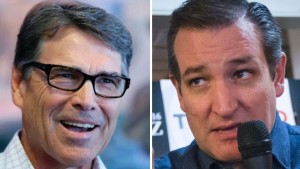
OK, so the nation’s political junkies’ eyes are turning this morning to places like Ottumwa, Indianola and Dubuque.
Iowa goes to the polls today, sort of.
The rest of us will know sometime this evening who Iowans prefer to become the Republican and Democratic presidential nominees.
I don’t want to dismiss the importance of these caucuses, which both parties do differently. Republicans actually cast ballots; Democrats go into rooms and argue with each other.
It still just involves a single state. Iowa is a fine place. I’ve been there a couple of times. But it comprises a relatively small population and only a fraction of Iowans are going to take part in these caucuses.
The really, really big show starts on March 1.
New Hampshire next week? South Carolina the week after that? Pffftt!
Texas comes into play on that first day in March when we take part in what amounts to a national primary. We’ll join about 20 other states in selecting delegates to the party conventions.
I do not believe the Republican field will be quite as crowded as it is this morning. Some of the 11 candidates will pull out, perhaps after tonight’s caucuses, or after the New Hampshire primary.
The Democrats might still have a three-person race when the dog-and-pony show comes to Texas.
For those of us who like this process, Texas usually has been a sort of political backwater. We have conducted our primaries relatively late in this nominating process, making our votes meaningless.
Not this year.
There will be some real excitement this year that could rival the 2008 primary.
Eight years ago, the Democrats were engaged in a brass-knuckle fight between Sens. Hillary Clinton and Barack Obama. The primary occurred that year while the two of them were still battling for their party’s nomination.
A fascinating development occurred that year. Democrats drew far more attention in Republican-laden Texas. My wife and I live in Randall County, one of the most GOP-friendly counties in this state. The Democratic Party primary polling place was many times busier that day than the Republican polling station at the Baptist church where we vote.
Why? A lot of Republicans were crossing over to vote in the Democratic primary to cast their votes for who they thought would be the weakest candidate who would run against the GOP nominee.
Clinton won the Texas Democratic primary, but the nomination went eventually, of course, to Obama.
The rest is history.
Will there be a similar display of system-gaming this year? Might there be thousands of Democrats casting Republican primary votes to help nominate the person they think would be the weakest foe this fall? The state’s open primary system allows for that kind of tomfoolery.
If it happens, well, that’s how it goes.
Whatever happens on primary day in Texas will matter — a lot — in determining the next president of the United States.
I look forward to all the attention that will come to places like Marfa, Palestine — and perhaps even Amarillo.





